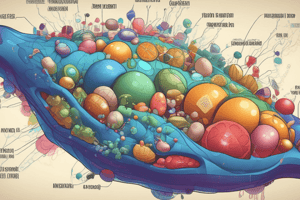Podcast
Questions and Answers
What is the approximate amount of glycogen stored in the liver?
What is the approximate amount of glycogen stored in the liver?
- 100-120g (correct)
- 300-350g
- 200-250g
- 50-60g
What is the primary function of glycogen in muscle cells?
What is the primary function of glycogen in muscle cells?
- To maintain blood glucose levels
- To store excess glucose for liver metabolism
- To provide energy for muscle contraction (correct)
- To regulate insulin and glucagon secretion
What is the key enzyme responsible for the conversion of glucose to glycogen?
What is the key enzyme responsible for the conversion of glucose to glycogen?
- Glycogen synthetase (correct)
- Insulin
- Glycogen phosphorylase
- Glucagon
What is the significance of glycogen's branched structure?
What is the significance of glycogen's branched structure?
What is the primary hormone responsible for regulating glycogen synthesis in the liver?
What is the primary hormone responsible for regulating glycogen synthesis in the liver?
What is the approximate amount of glycogen stored in muscle cells?
What is the approximate amount of glycogen stored in muscle cells?
What is the result of glycogen breakdown by phosphorylase?
What is the result of glycogen breakdown by phosphorylase?
What is the role of calcium ions in glycogen phosphorylase activation?
What is the role of calcium ions in glycogen phosphorylase activation?
What is the effect of insulin on glycogen phosphorylase?
What is the effect of insulin on glycogen phosphorylase?
What is the function of debranching enzyme in glycogen breakdown?
What is the function of debranching enzyme in glycogen breakdown?
What is the effect of adrenaline on glycogen phosphorylase?
What is the effect of adrenaline on glycogen phosphorylase?
What is the role of AMP in glycogen phosphorylase activation?
What is the role of AMP in glycogen phosphorylase activation?
What is the function of protein kinase in glycogen synthase regulation?
What is the function of protein kinase in glycogen synthase regulation?
What is the effect of high glucose levels on glycogen phosphorylase in the liver?
What is the effect of high glucose levels on glycogen phosphorylase in the liver?
What type of linkages are present in glycogen?
What type of linkages are present in glycogen?
What is the function of UDP glucose in glycogen synthesis?
What is the function of UDP glucose in glycogen synthesis?
What is the role of glycogenin in glycogen synthesis?
What is the role of glycogenin in glycogen synthesis?
What is the net result of the action of branching enzyme?
What is the net result of the action of branching enzyme?
What is the function of ATP/UTP/GTP in glycogen synthesis?
What is the function of ATP/UTP/GTP in glycogen synthesis?
What is the role of the reducing end of glycogen?
What is the role of the reducing end of glycogen?
What type of reaction is the formation of UDP glucose?
What type of reaction is the formation of UDP glucose?
What is the purpose of tightly regulated enzyme reactions in glycogen synthesis?
What is the purpose of tightly regulated enzyme reactions in glycogen synthesis?
Study Notes
Glycogen Synthesis and Degradation
- Glycogen is a branched polysaccharide with α-1,6 and α-1,4 glycosidic links, and its structure has physiological significance.
- The liver contains 100-120g of glycogen, which is sensitive to blood glucose concentration and plays a crucial role in maintaining constant levels of glucose in the blood.
- Muscle contains 250-300g of glycogen, which is sensitive to energy needs and is used as a rapid source of glucose for muscle contraction.
Features of Biosynthetic Pathways
- ATP, UTP, or GTP are required as cofactors to drive reactions forward.
- One or more enzyme reactions are irreversible, and alternative enzymes are used for the opposite direction.
- Enzyme reactions at the beginning or end of the pathway are tightly regulated.
Glycogen Synthesis
- Glycogen synthesis involves the conversion of glucose to glycogen, with glycogen synthetase as the key enzyme.
- The first stage of glycogen synthesis involves the formation of UDP glucose from glucose-1-P and UTP.
- UDP glucose is then added to a protein primer, glycogenin, to form a glycogen chain.
- Glycogen synthase and branching enzyme work together to produce the branched structure of glycogen.
Regulation of Glycogen Synthesis
- Glycogen synthase is regulated by phosphorylation, which inactivates the enzyme.
- Protein kinase and protein phosphatase play a crucial role in the regulation of glycogen synthase.
Glycogen Breakdown
- Glycogen breakdown involves the conversion of glycogen to glucose, with glycogen phosphorylase as the key enzyme.
- Glycogen phosphorylase breaks down glycogen into glucose-1-phosphate, which is then converted to glucose-6-phosphate.
- Glucose-6-phosphate is then converted to glucose in the liver.
Regulation of Glycogen Breakdown
- Glycogen phosphorylase is regulated by phosphorylation, which activates the enzyme.
- Protein kinase and protein phosphatase play a crucial role in the regulation of glycogen phosphorylase.
- Additional controls include insulin and glucagon, which regulate glycogen phosphorylase in the liver, and adrenaline, calcium, and AMP, which regulate glycogen phosphorylase in muscle.
Studying That Suits You
Use AI to generate personalized quizzes and flashcards to suit your learning preferences.
Description
Assess your knowledge of glycogen synthesis and degradation, including its structure, importance in maintaining blood glucose levels, and regulation. Ideal for MBBS Stage one students.




